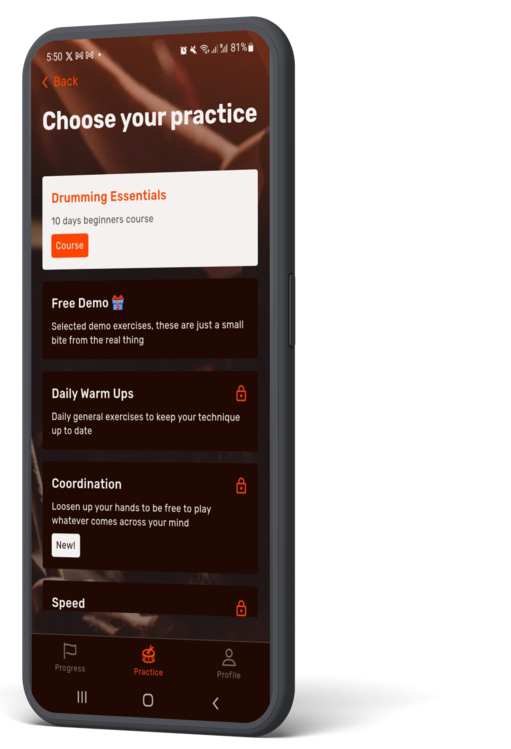Ready to elevate your drumming skills? Start your journey to greatness with Drum Coach! Dive into our Drumming Essentials course designed for beginners and enjoy:
🥁 5 minutes of fun, daily exercises.
🎵 A beginner-friendly approach to improve steadily.
💡 Engaging drum lessons that make learning easy and effective.
Learning to play the drums can be an exhilarating and rewarding journey, filled with challenges and triumphs. Whether you’re an aspiring drummer dreaming of taking the stage or someone looking to enjoy playing as a hobby, mastering the drums requires dedication, patience, and the right strategies. This guide explores effective strategies to learn drums, ensuring that every beat and rhythm enhances your musical journey.
1. Establishing a Solid Foundation with Basic Drumming Principles
The cornerstone of learning to play the drums effectively lies in building a strong foundation. This means getting acquainted with basic drumming principles such as understanding rhythm, timing, stick control, and the basic drum rudiments. Start with learning the essential beats and patterns that form the backbone of most drum music. Practicing these fundamentals diligently sets the stage for more complex techniques and rhythms. Remember, the quality of your foundation determines the heights you’ll reach in your drumming skills.
Listening attentively to music you enjoy plays a critical role in developing an intuitive understanding of rhythm and timing, which are essential for any drummer. This practice isn’t just about enjoying the melody or the lyrics but involves focusing on the drum tracks, identifying the beats, fills, and the drummer’s techniques. Start by picking songs from your favorite genres and listen specifically to the drum parts. Try to break down the rhythmic patterns you hear—how does the drummer transition between verses and choruses, what fills do they use to lead into different sections of the song, and how do they vary the intensity and dynamics throughout?
This active listening exercise is not just about imitation but about inspiration. It trains your ear to pick up on subtle nuances and broadens your rhythmic vocabulary. Furthermore, as you become more familiar with different drumming styles and techniques through listening, you’ll find it easier to incorporate these elements into your own playing, adding depth and diversity to your drumming.
Active listening is not just about imitation but about inspiration. It trains your ear to pick up on subtle nuances and broadens your rhythmic vocabulary

On the other hand, learning to read drum notation is another fundamental skill that will serve you well throughout your drumming journey. The ability to read sheet music opens up a new world of learning resources, from drumming exercises and rudiments to full song transcriptions. It allows you to precisely understand and replicate the drum parts you hear in your favorite songs, providing a direct pathway from listening to playing. Moreover, as you learn to transcribe songs yourself, you’ll gain a deeper understanding of rhythmic structures and how different drumming techniques can be applied to create specific musical effects. This skill not only enhances your ability to learn new songs more efficiently but also lays the groundwork for composing your own drum parts in the future.
Together, actively listening to music and learning to read drum notation build a strong, well-rounded foundation for your drumming. They equip you with the skills to not only play but to truly understand and feel the music you’re creating, ensuring your development as a versatile and expressive drummer. These practices, combined with consistent, focused practice, will accelerate your progress and deepen your connection to the rhythm that drives the music we love.
Aspiring to greatness on the drums? Let Drum Coach show you how, with only 5 minutes of fun, daily practice. Watch your drumming transform swiftly!
Get ready to take your drumming to the next level. Get expert tips on coordination, drumming techniques, improvisation and more in the post titled “Charting Your Drumming Journey”. / Written by: Raul Rodrigues: CEO of Drumap, Drummer, Music School Director and Mariano Steimberg: Drum Professor at Berklee College of Music, Valencia Campus.
2. Incorporating Technology and Apps in Drum Learning
In today’s digital age, technology offers an array of tools that can significantly enhance your drum learning experience. From metronome apps that help improve your timing to drumming apps and software that provide interactive lessons and feedback, technology can be a powerful ally in your learning journey. Video tutorials and online drumming courses can also provide valuable insights and techniques directly from seasoned drummers. Make the most of these technological tools to complement your practice, keep you motivated, and track your progress.
A prime example of such innovation is Drum Coach. Drum Coach is designed to streamline your practice routine, making every session productive and focused. With its intuitive interface, the app offers a vast library of exercises and lessons tailored to various skill levels—from beginners to advanced players. What sets Drum Coach apart is its ability to organize your practice routine into manageable segments, ensuring you cover essential techniques, rhythms, and styles in a systematic way. By integrating Drum Coach into your practice, you’re not just practicing; you’re engaging in a guided journey towards mastering the drums, ensuring that each practice session brings you one step closer to achieving your drumming goals.
Get your drumming to the next level in just 10 days 🚀
Find your perfect practice routine with Drum Coach with exercises tailored for all levels. With Drum Coach you get:
- Drums lessons crafted by Mariano Steimberg, professional drummer, and professor at Berklee College of Music.
- Unlock over 500 drum exercises and rudiments
- Start Free with the Drumming Essentials course. No fancy gear needed!

3. The Role of Muscle Memory and How to Develop It
The journey to becoming proficient on the drums is paved with repetition and consistency. Muscle memory and coordination are not merely aspects of drumming; they are the foundation upon which all drumming skills are built. To execute complex rhythms and maintain steady beats, a drummer’s limbs must be able to operate independently, yet in perfect harmony. Achieving this level of coordination requires a focused practice regimen that encourages the body to internalize each movement until it becomes second nature.
Frequent practice sessions play a pivotal role in developing this muscle memory. When you repeatedly practice a particular drumming pattern, you are essentially programming your muscles to remember those actions. Over time, these movements become automatic, allowing you to perform them without conscious thought. This is the essence of muscle memory, and it’s what enables drummers to concentrate on the more creative aspects of their performance, such as dynamics and expression, rather than on the mechanics of each stroke.

Frequent practice sessions play develop muscle memory. Practice drumming patterns frequently.
Moreover, the development of coordination through frequent practice extends beyond simply being able to play a set pattern. It enhances your ability to adapt and respond to new rhythmic challenges with ease. Whether it’s incorporating a new fill into a familiar beat or adjusting to play in different time signatures, a well-developed sense of coordination and muscle memory provides the flexibility and confidence necessary to explore the full range of your creative expression on the drums.
It’s important to note that the quality of practice matters as much as the quantity. Short, focused practice sessions where attention is paid to technique and accuracy can be more beneficial than longer, unfocused sessions. Incorporating a variety of exercises that target different aspects of drumming, from rudiments to polyrhythms, ensures that all muscle groups are engaged and developed evenly.
Ready to elevate your drumming skills? Start your journey to greatness with Drum Coach! Dive into our drumming essentials course designed for beginners and enjoy:
🥁 5 minutes of fun, daily exercises.
🎵 A beginner-friendly approach to improve steadily.
💡 Engaging lessons that make learning easy and effective.
In summary, the importance of frequent practice in developing muscle memory and coordination cannot be overstated. These elements are fundamental to achieving fluency on the drums, enabling drummers to move beyond the basics and express themselves more fully through their music. By dedicating time and effort to regular practice, drummers can lay a solid foundation for a lifetime of rhythmic exploration and enjoyment.
4. The Importance of Playing with Others and in Different Genres
Playing the drums is not just about solo practice; it’s also about making music with others. Jamming with other musicians can teach you invaluable lessons in timing, dynamics, and musical communication that you can’t learn alone. It exposes you to different playing styles and approaches, broadening your musical horizons. Additionally, exploring and playing a variety of musical genres enriches your versatility as a drummer. From rock and jazz to Latin and funk, each genre offers unique rhythms and challenges that will deepen your understanding and appreciation of music.
Get inspired by the stories of successful drummers in the music industry
5. How to Set Achievable Milestones in Your Drumming Journey
Setting clear, achievable milestones is crucial for maintaining motivation and tracking your progress. Begin by setting short-term goals that focus on mastering specific skills or pieces. Celebrate these small victories, as they are significant steps towards your larger goals. Also, establish long-term objectives, such as performing a complete song, joining a band, or recording your drumming. Regularly review and adjust your goals as needed, ensuring they remain challenging yet attainable. Remember, the journey of learning drums is a marathon, not a sprint, and every milestone achieved is a testament to your dedication and passion for drumming.
Mastering the drums is a dynamic and ongoing process that combines the fundamentals of drumming with the personal growth of the drummer. By establishing a solid foundation, developing muscle memory, leveraging technology, playing with others, and setting clear milestones, you can navigate your drumming journey with confidence and purpose. Embrace these strategies to learn drums effectively, and let every beat you play be a step closer to realizing your drumming aspirations.
Want to rock drum rudiments? Join the Drumming Essentials course in Drum Coach app! With just 5 minutes daily, elevate your skills in 10 days. Fun, easy, and effective. 🚀✨
Learn From the Pros: Gain Insight into Advanced Drumming Techniques from people in the industry










